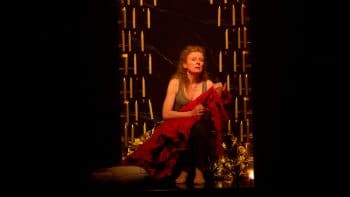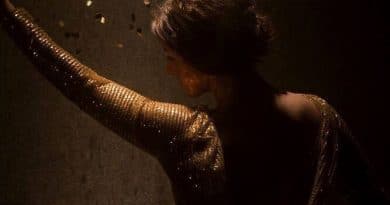The Testament of Mary – Sydney Theatre Company
History has traditionally been told through the words and stories of men, and the Gospel is no exception. Sydney Theatre Company’s first production of 2017, The Testament of Mary, seeks to counter this by presenting a compelling, unravelling monologue from the perspective of Mary, mother of Jesus (Alison Whyte), that forefronts her maternal humanity in place of the focus on iterations of Jesus’ iconography in the Bible.

The opening scene is stunning: We see a stylised Virgin Mary holding a lamb, gorgeously illuminated and encircled by increasingly glowing candles (lights designed by Emma Valente). But this portrait – Mary as an iconic figure – crumbles. Mary leaves the altar, strips away her clothes and throws away the burning red heart inside of her. What remains is a Mary that we have not seen before, dressed in a simple tank top and pants. This Mary bears her heart on stage. She is no longer Mother of the Son of God, but a woman and a mother – capable of tormented, uncertain feelings and finally ready to speak.
Working in an episodic manner, Mary expresses her concern for her son, his radicalisation by the Disciples, and the devastating effects that his powers have upon him, leading to his Crucifixion. But because we see these things through Mary’s eyes, we finally also see her own suffering.
This is writer Colm Tóibín’s transformation of a passive woman who was entrusted by God to give birth to Jesus into a woman who is an active figure devoted to her son, and, as a result, she is bitter and uncompromising to anything that steps in the way of that bond. Her refusal to ever speak Jesus’ name throughout the entire running time prevents Mary’s words from being overshadowed by other vantage points or religious ideals; she remains deservedly central.
Interspersed by blackouts to move the narrative forward, the play also advances with a discordant churn of a choral score by Max Lyandvert, the reverberations of which become louder and more uncomfortable as the events of Jesus’ life become progressively tragic.

As Mary, Whyte bears the agony of a mother who suffers with her child, balanced against a sense of composure: she is resolute, unafraid of voicing her grief and anger. The play relies on her sole endurance and ability to lift Tóibín’s script from the pages; she is impressive as she slips between vehement speeches and captivating reenactments of conversations, and at her most electrifying when she details the horror of watching her son crucified; it packs a punch in the intimacy of the Wharf theatres.
Tóibín’s text is a monologue that favours its lyrical and poetic rhythms, but it’s all pitched at much the same tone and there is little nuance to be found in its content. Mary’s sternness does not alter much, and character arc nor development is never truly evident. At times, there are glimpses of humour within the bitterness of Mary’s character that come off more wry than funny, which the audience didn’t know how to take. Despite its interesting premise and occasionally transfixing storytelling, this play isn’t very engaging.
However, Tóibín’s work is strongest and at its most successful when it self-reflexively acknowledges its work as fiction, particularly in its third act, where Mary interrogates the resurrection of Jesus and offers up questions about death and human utility.
Director Imara Savage, as well as designer Elizabeth Gadsby, place Mary behind museum-like bollards, casting the audience as spectators of an exhibition, forcing us to question the version of events we had been fed over the centuries. Tóibín’s script is less a religious debate than it is thought-provoking; it’s an examination of how perception of truth wavers according to its storyteller, and how the missing gaps of history are filled with women’s voices. We all hurt from their exclusion.
Throwing accepted truth into doubt and exposing the anguish of Mary’s story, Savage returns Mary back onto the podium from the opening scene to close the play. But this time Mary no longer bears the materials which glorified her figure as the Mother of Jesus – she has instead been humanised as a woman and a mother, and is unafraid to be seen as such.





I’d be surprised if this production gets good reviews outside Australia.
Pretentious and ‘intricate’ devices did little to hide the director’s lack of expertise on a novel of this nature.
STC’s version was not successful on its dramaturgical approach to the cultural, gender and religious agendas addressed in this play. Toibin’s Mary is NOT an Irish woman in casual-wear going on about the difficulties of a privileged life.
This topicalised Australian take on The Testament of Mary failed on being brave, bold and truthful to the text’s nature. It distances Australian audiences from a global context and from letting them engage with a more human theatre. It takes more than a couple of blackouts, a ‘contemporary approach’ and flitter on stage to make theatre edgy and bold.
Mexican version is nominated to theatre awards. The rather austere but culturally truthful Mexican production CHALLENGES audiences to think, feel and reevaluate their dogmas and paradigmas.